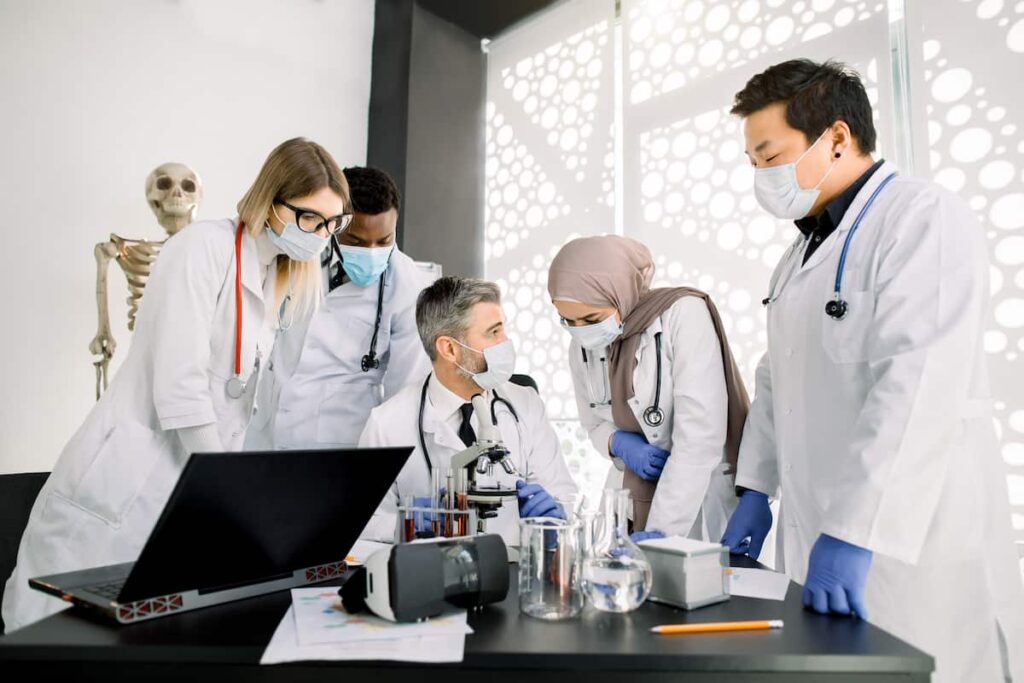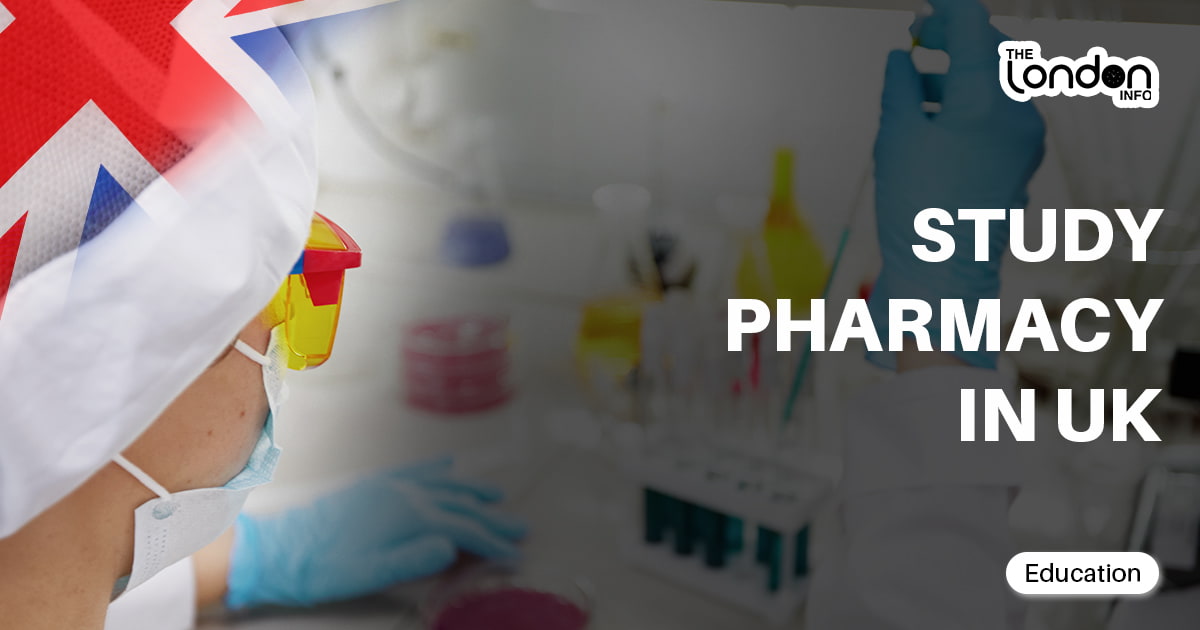A pharmacy degree in the United Kingdom is an excellent choice for those who are interested in chemistry and how medicine may help individuals with their medical conditions.
It doesn’t matter whether you’re working at a small neighbourhood drug store to dispense medication prescribed by a General Practitioner or in a large and complex hospital to ensure doctors, nurses, and patients receive the best possible care, a career in pharmacy is a great choice for anyone who is interested in health, disease, and science.
How to Become a Pharmacist?
If you want to continue your education after finishing your SPM or IGCSE, you would need to enroll in a pre-university program that would take 1-2 years to complete. Following the conclusion of your pre-university program, you may enroll in a Bachelor of Pharmacy degree, which can take up to four years to finish.
Training Period and Facility to Study Pharmacy in the UK
You will be required to complete one year of training and another year of obligatory service in a training facility that has been approved by the Pharmacy Board Malaysia after you have completed your undergraduate degree program. Additionally, throughout the training term, a test known as the Pharmacy Jurisprudence Examination will be administered.
To summarise, it will take you around 6 years to become a Fully Registered Pharmacist in the United States (FRP).
Why Should You Study Pharmacy in the UK?
1. Earn a Master’s Degree without first obtaining a Bachelor’s Degree
The MPharm is the title given to the pharmacy degree in the United Kingdom, which takes four years to complete. Because there is no counterpart of the BPharm in the United Kingdom, students who complete four years of study are awarded a Master’s degree (MPharm), rather than a Bachelor’s degree, as is the case in the United States.
2. It is current and applicable
The study and research of medical pharmaceuticals is one of the most popular courses taught at universities in the United Kingdom, especially in today’s world. The significant use of workshops and educational innovations throughout the curriculum demonstrates that the teaching approaches are up to date, as is the use of technology.
3. It is internationally recognized
Each MPharm is subjected to quality assurance by both the University and the General Pharmaceutical Council (GPhC), which is the independent regulation of the pharmacy profession in the United Kingdom. The GPhC certification gives assurance that every graduate of every MPharm degree program in the United Kingdom has met educational requirements.
Study Pharmacy in UK Courses
Introduction to Pharmacy
In the United Kingdom Whether working at a local drug store, dispensing medication from a General Practitioner, or working in a large and complex hospital, a Pharmacy degree is ideal for students who are interested in chemistry and how medicine can assist patients with their condition.

Generally speaking, pharmacy curricula take four years and include modules in pharmacology, biology, and organic chemistry, among other subjects. Working in the sector will also help students, as it will offer them useful insights and practical experience.
Modern laboratories will assist you in honing your abilities by providing you with replica medicine-dispensing stations, consultation rooms, and software that is utilized in the pharmacy profession.
MPharm
In order to finish their 3-year Bachelor’s degree and then go on to earn their 1-year Master’s qualification, students must first join at the Bachelor’s level and then progress to the MPharm degree.
Students enroll for this course as an Undergraduate degree via the University and College Admissions Service (UCAS), but they finish with a Master’s degree. It should be mentioned that certain colleges in the United Kingdom offer a 5-year MPharm degree that includes two six-month blocks of hands-on experience.
Applicants wishing to study Pharmacy in the United Kingdom should submit their applications solely to institutions that offer Master of Pharmacy (MPharm) programs.
Since, this is the only legitimate Pharmacy degree recognized by the Pharmacy Examining Board of Canada (PEBC). More information about returning to Canada with a Pharmacy degree from the United Kingdom may be found here.
Entry Requirements for Study in UK: Pharmacy
A Levels
A Level students will need to have studied Chemistry and generally one additional subject such as Biology, Maths or Physics. General Studies and Critical Thinking won’t be considered as part of your point’s total.
BTECs
BTEC students will normally need to have studied applied science or have this supplemented by one or two scientific-based A Levels.
GCSEs
You’ll require at least five GCSEs, with a grade C/4 or higher, including English, arithmetic and frequently a science-based topic. Some courses may need your GCSEs to be at a grade B/6 or better.
International Baccalaureate
A Higher Level in Chemistry with a grade 6 is mandatory for most Pharmacy programmes. Some courses will require that you have another scientific subject at Higher Level. Top institutions will want you to have a 6, 6, and 5 at Higher Level.

Alongside grades, institutions will look at how effectively you can show your comprehension of the topic and your desire to work as a pharmacist.
Express this via your own statement. Mentioning any previous employment experience you’ve got in the pharmacy field would help to strengthen your application.
IELTS
6.5 overall, with no lower than 6.0 in any one component.
You can also Study in the UK without an IELTS score.
Canadian High School requirements
At least 65% (All provincial High School diplomas accepted)
US High School Requirements
3 APs (or SAT subject tests) are generally required
Best Universities to Study Pharmacy in the UK
Pharmacy/Pharmacology is one of the most popular fields of study at the following universities, according to the Complete University Guide League Tables 2022:
- University of Cambridge (1st Overall)
- London Metropolitan University (1st for Student Satisfaction)
- University of Leeds (1st for Graduate Prospects)
- University of Dundee (1st for Research Quality)
Other Top Ranking Universities
University of Strathclyde, University of Dundee, University College London, Queen’s University Belfast, and University of Southampton are among the other institutions that rank among the top ten in the world.
When selecting an MPharm course, it is not so much about whether or not it is offered by one of the aforementioned institutions as it is about whether or not it is completely accredited by the Royal Pharmaceutical Society of Great Britain.
If you get this designation, it means that your university’s instruction meets the rigorous requirements established by the Society, and that you will be eligible to register as a pharmacist when you have graduated.
You should also take the following factors into consideration:
Optional modules are available
Pharmacy degrees will provide you with the same general skills and information as other degrees, but they will do it in a different method. Module options differ from university to university, so make sure to look into what modules are available for each degree before applying.
Methods of instruction and evaluation are discussed
Most Pharmacy degrees will instruct you using a combination of theoretical and practical approaches, while the amount of time spent on each method may vary. Some institutions additionally provide you with the opportunity to do a supervised research project during your final year, but others do not do so.
Work experiences are offered as part of certain degrees, but not all of them. If you want to choose the best course for you, think about how you want to study and be evaluated before you start looking.
Pre-registration or no pre-registration to take into consideration
The average length of a pharmacy degree is four years in total. Once you’ve completed your degree, you’ll need to apply for a one-year pre-registration term at a real pharmacy under the supervision of an experienced pharmacist.
Some colleges offer a five-year Pharmacy degree that includes a year of pre-registration, which means you’ll be a fully-licensed pharmacist by the time you complete the program.
Scholarships to pursue a degree in pharmacy in the United Kingdom
You may apply for one of the scholarships for studying Pharmacy in the United Kingdom to help alleviate the financial load. All of the scholarships are awarded on the basis of merit, academic achievement, and other abilities.
Student loans to study in the United Kingdom, in addition to scholarships, may be a great help in alleviating financial hardship.
In addition, there are a number of undergraduate scholarships available for international students wishing to study in the United Kingdom. Generally speaking, there are three sorts of scholarships available in the United Kingdom for overseas students:
Types of Scholarships
a. International scholarships
b. Scholarships that are special to a country
c. Scholarships for higher education
There are a lot of Scholarships in the UK for you to know about your eligibility and criteria you need to earn yourself a scholarship in the UK.
Careers in Pharmacy
In the UK, there are a lot of opportunities to choose a lifechanging career in pharmacy. It is possible for a pharmacy graduate to enter into one of three different jobs.
Pharmacist
The vast majority of pharmacists work in large hospital pharmacies or community pharmacies, where they ensure that over-the-counter medications are dispensed accurately and in a timely manner.
Patients get the proper drug; they receive advice on treatments and how to control their dosages; and they collaborate closely with physicians, nurses, and other health-care workers to provide the best possible care.
Pharmacy Assistant
The role of a pharmacy assistant is to work alongside technicians and to conduct a wide range of tasks on an as-needed basis.
This might include a variety of tasks such as receiving and dispensing prescriptions, assisting with the ordering of inventory to ensure demand is fulfilled across many departments, and advising consumers on the best course of action.
Pharmacy Technician
Technicians are often employed in two settings: hospitals and community pharmacies, and they are responsible for ensuring that patients get the proper quantity and amount of medication. Pharmacy technicians may specialize in a variety of professions, including production, quality control, and clinical trials, among other things.
What do Pharmacy Graduates earn?
Pharmacy is a profession with a heavy salary and compensates for all the hard studying and practices on the practical field. However, the salary gets expanded with time and these are the average beginning salaries.
Starting Salary
Average beginning professional salary: £18,500
Average initial non-professional salary: £16,800
Ending Verdict
Pharmacy studies normally span for four years and modules will look at pharmacology, biology and physiology, pharmaceutics, chemistry, ethics and economics.
Students will also benefit from job assignments inside the sector to give vital insights and professional experience. State-of-the-art laboratories will assist hone your abilities with replica medicine-dispensing stations, consultation spaces and computers connected to the systems utilised by the Pharmacy business.








